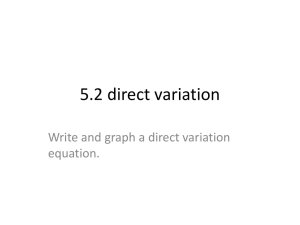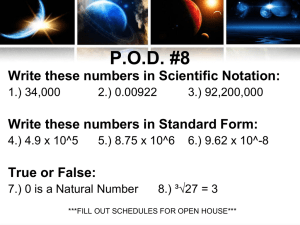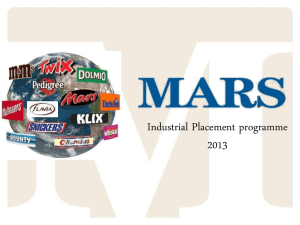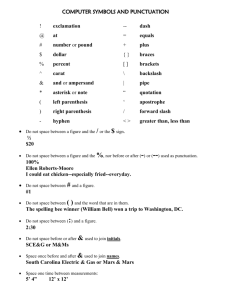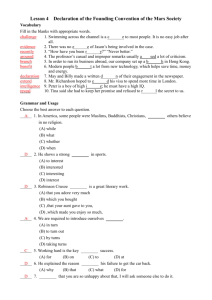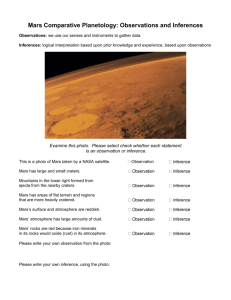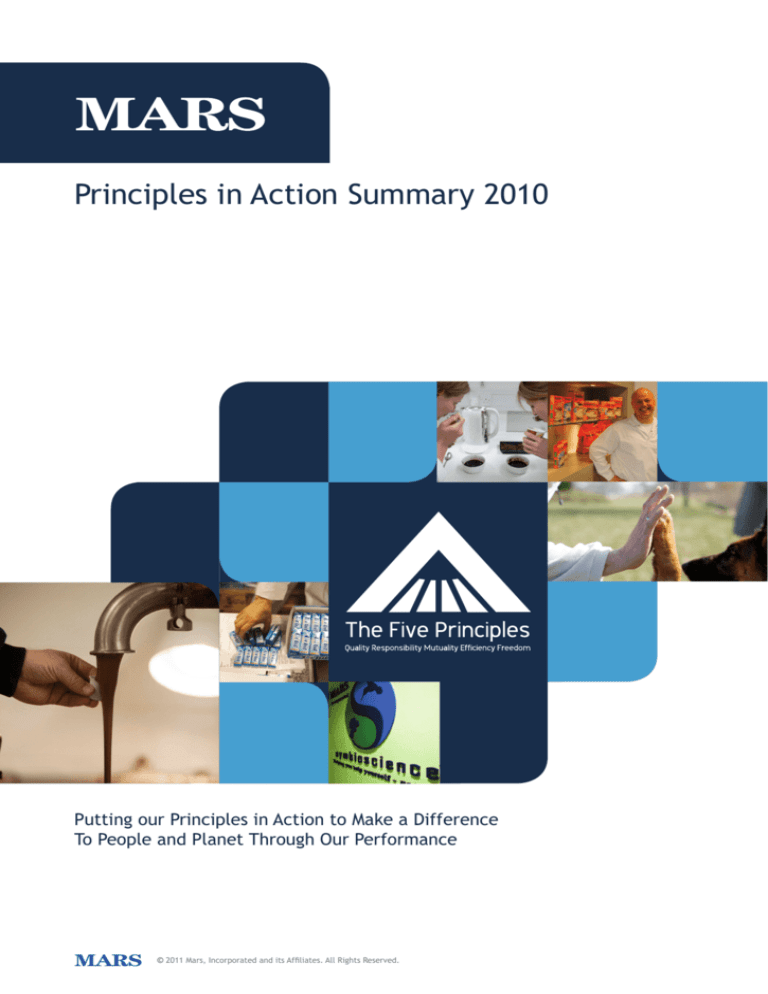
Principles in Action Summary 2010
Putting our Principles in Action to Make a Difference
To People and Planet Through Our Performance
© 2011 Mars, Incorporated and its Affiliates. All Rights Reserved.
Mars, Incorporated Principles in Action Summary 2010 | Introduction
Mars
Introduction
We have a passion for pets and
produce some of the world’s leading
pet food brands
Mars, Incorporated.
Chocolate and much more…
When people think of Mars, most often they think of chocolate — and
we do make some of the best-loved chocolate in the world. But we’re
much more. We are a privately owned company with more than 65,000
Associates who are committed to delivering the best quality in pet care,
making office breaks more refreshing with delicious teas and coffees,
putting wholesome food on family tables and bringing smiles to millions
around the world with our gum, confections, and of course, chocolate.
Our business was built on the fundamental belief that, to endure, we must
deliver mutual benefits for our business and all our stakeholders, including
our Associates, retail customers, consumers, suppliers and communities.
We are guided and governed in this effort by Mars’ Five Principles: Quality,
Responsibility, Mutuality, Efficiency and Freedom.
Our objective as a business is to put our Principles in action every day, to
make a difference for people and the planet through our performance. This
objective dates back to the philosophy of Forrest Mars, Sr. in the 1930s.
As a privately owned company, we have traditionally communicated
more about our brands than about ourselves as a business. But, today
people want to know more about the businesses they choose to support.
In this, our first major communication about how we put our Principles
in Action, we share more about who we are and what we stand for. We
explain our ambitions as a business committed to our Five Principles,
and acknowledge where we are making progress and where we are still
seeking the best ways forward.
Thank you for taking the time to learn more about Mars. Please ask
questions, tell us what you think on 001 9736913536
See a summary of how we performed.
© 2011 Mars, Incorporated and its Affiliates. All Rights Reserved.
SNICKERS ® , one of our many billiondollar brands, is produced all around the
world, including in Waco, Texas, U.S.
Mars, Incorporated Principles in Action Summary 2010 | Introduction | Letter from Paul S. Michaels
Mars
Letter from
Paul S. Michaels
To know Mars, Incorporated is
to understand our heritage and
The Five Principles that guide
us every day
What most people know about Mars is that we have a portfolio of brands
that are loved by billions of consumers around the globe. What most
people don’t know is that we are one of the world’s leading privately-owned
corporations with more than 65,000 Associates, and that we touch millions
more in the communities where we operate or source our ingredients.
We have always been active in communicating about our products, but
historically did not feel the need to say much about our company. Why
change now? And, why this particular summary?
Times have changed. It used to be that consistently delivering the highest
quality and value in products and services was the most important thing
a company needed to do to earn the trust of its stakeholders. Those
expectations have in no way diminished, but today, there is also an
expectation that companies demonstrate quality and values in everything
they do to bring these products to market. Very reasonably, people want
to know that they are choosing to support companies that meet their
responsibilities to their Associates, consumers, customers, suppliers,
communities and the environment.
As president and CEO of Mars, I am proud that delivering against these
responsibilities is at the very heart of who we are and has been for
generations. To know Mars, Incorporated is to understand our heritage,
and the Five Principles that guide us every day, are at the heart of how we
operate, and have helped us become the successful global food business
we are today.
These Five Principles: Quality, Responsibility, Mutuality, Efficiency and
Freedom, unite all of us at Mars across generations, geographies,
languages and cultures.
Our business purpose, first expressed by Forrest E. Mars, Sr. in the early
1930s, calls upon us to create mutual benefits for all of our stakeholders.
This purpose, and the stewardship of the Mars Family, inspire us to put
our Mars Principles in action in everything we do, and strive to make a
difference to people and the planet through our performance.
We do have a positive impact on the environment and the quality of life of
many around the world, but we also have some challenges.
lives of the millions of farmers that supply our raw materials. Some of
these crops provide profitable livelihoods for growers. In others, like cocoa,
there is the need to improve the prosperity of farmers – and ensure that
these farming communities are reaping the benefits of supplying the global
chocolate industry.
We manage our environmental and social impacts by leveraging the best
science possible to understand, chart and minimize the negatives, and
maximize the positives – working with partners of all types: governmental,
non-governmental, academic and corporate. Where Mars is a major global
player in a given material – such as cocoa and rice – we can be leaders in
progress toward sustainable, positive developments. Where we are less
important consumers – as in grains and sugars – we are equally committed
to playing our part through partnership with others better equipped to
deliver positive change.
Mars’ boldest environmental strategy is what we call Sustainable in a
Generation: by 2040 our offices and plants will use no fossil fuels and
emit no greenhouse gases, and we are developing similar long-term
commitments for waste and water.
In addition to an explanation of these targets, this summary describes how
we are putting our Principles in action across our entire business, including
our focus on our supply chain, health and nutrition of our products, and
creating a workplace where all our Associates are free to demonstrate
leadership, learn and grow.
My thanks to all of the Mars Associates that bring our Principles to life
every day and, in particular, to the Mars family that have enabled all of us
to create a business of which we can be proud.
My thanks also to the critical partners that have helped us move forward
with our ambition to make a difference for people and the planet through
our performance and who continue to work with us to tackle our on-going
challenges and opportunities. We are on a journey as a company, and we
are pleased to share with all our Associates and partners the roadmap
we’re developing for the future and our progress to date.
Our main environmental impacts occur in the fields, forests and oceans
that supply the ingredients for our chocolate, confections, foods, pet
foods and hot drinks. Our manufacturing also has an impact via carbon
emissions, water use and waste generation.
We are also focused on our social impacts through our products, and
in our operating and sourcing communities. In addition to employing
thousands in our manufacturing sites and contributing to the economic
prosperity of our operating communities, we play an important role in the
© 2011 Mars, Incorporated and its Affiliates. All Rights Reserved.
Paul S. Michaels
Mars, Incorporated Principles in Action Summary 2010 | Our Approach to Business | The Mars Five Principles
Our Approach to Business
The Mars
Five Principles
Efficiency
We use resources to the full, waste nothing and do only what we can
do best.
Our strength lies in our efficiency, the ability to organize all our assets –
physical, financial and human – for maximum productivity. In this way, our
products and services are made and delivered with the highest quality, at
the least possible cost, with the lowest consumption of resources; similarly,
we seek to manage all our business operations with the most efficient
processes for decision making.
Freedom
We need freedom to shape our future; we need profit to remain free.
The Five Principles unite us across
geographies, languages and cultures
The Mars Five Principles of Quality, Responsibility, Mutuality, Efficiency and
Freedom are the foundation of our culture and our approach to business.
They unite us across generations, geographies, languages and cultures.
Our Five Principles are synonymous with Mars and have been guiding
Mars Associates throughout most of our company’s history. Every day
we do our best to put our principles in action through our work and
our relationships with our consumers, customers, business partners,
communities and one another.
Quality
The consumer is our boss, quality is our work and value for money is
our goal.
Our company is dedicated to the highest quality in all the work we do.
Quality is the uncompromising standard for our actions, and it flows from
our passion and our pride in being part of the Mars community. Quality
work, which results from our personal efforts, is the first ingredient of
quality brands and the source of our reputation for high standards.
Responsibility
As individuals, we demand total responsibility from ourselves; as
Associates, we support the responsibilities of others.
We choose to be different from those corporations where many levels of
management dilute personal responsibility. All Associates are asked to take
direct responsibility for results, to exercise initiative and judgment and to
make decisions as required. By recruiting ethical people well suited to their
jobs and trusting them, we ask Associates to be accountable for their own
high standards.
Mutuality
A mutual benefit is a shared benefit; a shared benefit will endure.
We believe the standard by which our business relationships should be
measured is the degree to which mutual benefits are created.
These benefits can take many different forms, and need not be strictly
financial in nature. Likewise, while we must try to achieve the most
competitive terms, the actions of Mars should never be at the expense,
economic or otherwise, of others with whom we work.
© 2011 Mars, Incorporated and its Affiliates. All Rights Reserved.
Mars is one of the world’s largest family-owned corporations. This family
ownership is a deliberate choice. Many companies began as Mars did, but
as they grew larger and required new sources of funds, they sold stocks or
incurred restrictive debt to fuel their business. To extend their growth, they
exchanged a portion of their freedom. We believe growth and prosperity
can be achieved another way.
Mars, Incorporated Principles in Action Summary 2010 | Our Approach to Business
Mars
Our Approach
to Business
The Five Principles on display at Mars
Chocolate’s U.S. HQ in Hackettstown,
New Jersey
At Mars, we have a deep respect for the environment and communities in
which we operate and acknowledge our considerable impacts on people
and the planet. We rely on farmers and nature for many of our ingredients.
We operate 132 factories worldwide, serve millions of consumers around
the globe and employ more than 65,000 people across our diverse
business segments.
Being a privately owned company gives us the freedom to take a long-term
view. We can make investments that demonstrate our responsibility not
only to our owners, but to all the people and communities with whom we
work. Our approach is focused on creating lasting, mutual benefits for our
business and all those involved in its success.
Open Workspaces Encourage
Collaboration and Communication
Open communication and collaboration among Associates of all
levels is an important part of the way we do business. For eighty
years, our buildings’ open floor plans have facilitated this way of
working. Mars sites are open spaces with few enclosed rooms or
individual offices — not even for our Chief Executive Officer Paul
S. Michaels. There are no executive dining rooms or reserved
parking spaces, or other divisive symbols of status at Mars. We
are one team.
We are a global company that acts locally. Our business segments
are decentralized and, while many decisions are driven by needs in
each market, we are always guided by our Five Principles of Quality,
Responsibility, Mutuality, Efficiency and Freedom, which have shaped our
culture and our business for decades.
A company of our size and global scope affects people and the planet in
many ways. We must identify the social and environmental impacts most
significant (or “material”) to our business, and our stakeholders, and focus
our efforts appropriately.
We know that making principle-based decisions alone will not help us
address these challenges. It is by working with others, including our
customers, suppliers, governments, nongovernmental organizations,
industry, academia and research centers that we can create a mutually
successful future. We hope this website will start new conversations and
create opportunities for additional successful collaborations.
A typical Mars open-plan office
© 2011 Mars, Incorporated and its Affiliates. All Rights Reserved.
Mars, Incorporated Principles in Action Summary 2010 | Our Approach to Business
What Sustainability Means to Mars
Based on the foundation of our Five Principles, we seek to create
lasting, mutual benefits for all those involved in our business success by
creating positive social impacts, minimizing our environmental impacts
and creating economic value. Without integrating all these aspects into
our business, our company will not endure in the long term.
We are working on strategies and targets for social and
environmental impacts in all areas of our value chain and have
already set long-term environmental goals for our factories and
offices (which we call our “operations”), where we have direct control.
We are committed to achieving zero fossil-fuel energy use and zero
greenhouse-gas emissions by 2040, and are developing similar
commitments for waste and water use. We have short-term targets
to help us monitor our progress.
Our Areas of Focus
We focus on several key areas regarding our impacts on people and the
planet. Our priorities are defined by what we see as our responsibilities,
relevance to our partners and communities and our ability to create
meaningful and lasting benefits. Wherever possible, we use science to
define the challenge or opportunity and promote innovative thinking and
solutions. Our focus areas are:
Health and Nutrition: As a leading food business, we have a responsibility
to help address challenges of health and nutrition. We tackle these
challenges through a program of information, renovation and innovation
backed by scientific evidence. This includes providing the information
consumers need to make smart decisions about their caloric intake,
renovating product formulas to reduce calories, sodium and partially
hydrogenated vegetable oils, and innovation, including developing new
products that are focused on more active, healthy lifestyles.
Our Supply Chain: As a major user of agricultural products and other
natural raw materials, we have a responsibility to ensure reliable
supplies of our key ingredients in ways that improve the livelihoods of
farming communities and limit impacts on natural resources.
Our Operations: As a global manufacturer, we seek to operate at peak
efficiency, reducing costs while ensuring that our activities have the least
possible impacts on the environment. We are committed to achieving
zero fossil fuel-energy use and zero greenhouse-gas emissions by
2040, and are developing similar commitments for waste and water use.
Our Products: We are making it easier for people to consume our
products and dispose of waste and packaging responsibly. Reducing
packaging materials and the energy needed to make our drinks, snacks
and foods is good for the planet and saves money for Mars, our retail
customers and consumers.
Working at Mars: Mars Associates are the core of what and who we are.
We are committed to creating a workplace where all Associates are free
to demonstrate leadership, learn, grow and make a difference for people
and the planet through their performance at work.
© 2011 Mars, Incorporated and its Affiliates. All Rights Reserved.
Mars, Incorporated Principles in Action Summary 2010 | Our Approach to Business | The Story of Mars
Our Approach to Business
The Story
of Mars
Forrest E. Mars Sr entered the pet
care business in 1935
In 1911, Frank C. Mars began making candies in his Tacoma, Washington,
U.S., kitchen and established our first roots in the confectionery business.
In the 1920s, his son, Forrest E. Mars Sr., joined his father in business
and together they launched the now world-famous MILKY WAY® bar. In
1932, Forrest Sr. moved to the United Kingdom where he founded his
own company with a dream of building a business model based on his
philosophy of a “mutuality of benefits” for all stakeholders. This vision
serves as the foundation of the Mars, Incorporated we know today.
A natural entrepreneur, Forrest Sr. began the geographic expansion
and diversification of the Mars business. In 1935, Mars entered the pet
care arena. In 1940, he founded the M&M’S® business in the United
States, and in 1943 he entered the food business. Forrest E. Mars Sr.
made Washington, D.C., the headquarters of his diversified company,
Food Manufacturers, which eventually grew larger than the original
confectionery business that his father had started. In the late 1960s,
Forrest Sr. acquired the business founded by his father, which had been
headquartered in Chicago since 1929. He named the combined company
Mars, Incorporated.
In the decades Forrest Sr. led the business, he demonstrated his belief
that a company can only endure and thrive if it is creating mutual benefits
for all those involved — through the way he ran the business and in his
documentation of this Mars business principle. The next generation of
the Mars family, Forrest E. Mars Jr., John F. Mars and Jacqueline Badger
Mars, led the globalization of Mars, Incorporated. They also carried forward
the cultural foundation established by their father with the articulation of the
Five Principles of Mars: Quality, Mutuality, Responsibility, Efficiency and
Freedom. These themes continue to be deeply woven into the fabric of the
Mars culture, its operations and its long-term view. Today, the stewards of
these principles include the Mars family and thousands of Mars Associates.
Led by nonfamily management since 2001 and h eadquartered in McLean,
Virginia, in the United States, Mars continues to prosper as a Principlesbased business. As recently as 2008, Mars became a leader in gum and
confections with the purchase of the Wrigley Company. Today, Mars has
annual sales of more than $30 billion, and every day more than 65,000
Associates are putting the Five Principles in action to make a difference for
people and the planet through performance.
Read more about the history of Mars, Incorporated and our Five Principles.
© 2011 Mars, Incorporated and its Affiliates. All Rights Reserved.
Mars, Incorporated Principles in Action Summary 2010 | Our Approach to Business | Governance
Our Approach to Business
Governance
Each segment has a sustainability champion and/or director, who sits on
a corporate Sustainability Leadership Team (SLT) alongside the Chief
Sustainability Officer. The SLT agrees Mars-wide strategy and policies
on matters relating to sustainability and also includes representatives
from our manufacturing, sales, marketing, purchasing, corporate affairs
and science functions.
A Sustainability Working Group, comprised of corporate-level sustainability
managers plus representatives from each segment, develops policies and
practices for approval by the SLT, with support from working groups that
are developing our strategies for specific issues, such as human rights and
sustainable palm oil sourcing.
Mars Global Advisors
Mars, Incorporated also seeks input from outside advisors on issues of
importance to its business. The Mars Global Advisors are an advisory-only
group of external experts who engage the senior management of Mars,
Incorporated in strategic dialogues regarding major public policy, geopolitical
and macroeconomic issues and trends, and how they affect business
strategies and priorities. Members of the Mars Global Advisors group include:
Associates at the Mars Symbioscience
Makassar site in Indonesia
We are a global company that is strategically aligned, but acts locally. Our
business segments and markets may vary their approaches to reflect the
needs of their own customers and markets. But, around the world, we share
a commitment to putting our Five Principles in action to make a difference
for people and the planet through our performance. Our governance and
management structure is set up to ensure clear accountability and adherence
to the Mars Five Principles across all business units and business practices
and ensure we consistently act with integrity in all our dealings.
“Essence of Mars” and other training and development programs, like our
Legal Compliance Training, ensure all Associates understand that they are
accountable for applying the Five Principles in their business dealings.
Board of Directors and Management Team
Mars, Incorporated is a privately owned company governed by a Board
of Directors who are members of the Mars family. The company is run by
a global management team led by President and CEO Paul S. Michaels.
Read more about the Board and Management Team.
I appreciate Mars’ willingness to listen to tough questions about
their products and business. Their readiness to engage in this kind
of challenging dialogue has resulted in tangible improvements in
the choices they provide consumers as well as the information
needed to make their decisions.
David Kessler, Mars Global Advisor
Setting Policy
Our Global Food Policy Group sets globally consistent positions, policies
and standards to ensure the Five Principles are reflected in the way we
operate, while providing enough freedom to meet regional requirements.
The group’s members represent all major functions and business
segments. It is led by our Global Head of Public Policy. Our policies and
standards cover diverse areas, with examples including our Supplier Code
of Conduct, the Mars Marketing Code, and our global Quality and Food
Safety Standards. Download all our policies here.
Each of our business segments is putting strategies and resources in place
to manage its impacts on people and the planet and to contribute to areas
such as health and well-being. We also have measures in place to ensure
these approaches are consistent and that best practices are shared across
the business.
Mars Food Associates
© 2011 Mars, Incorporated and its Affiliates. All Rights Reserved.
The establishment of Mars Global Advisors is a signal of Mars’
determination to harness external perspectives to help it meet
the challenges of a rapidly changing world. The way in which the
Advisors have been welcomed into Mars and invited to contribute
to its principles-based approach to doing business, in my
view, is unique.
Alan Milburn, Mars Global Advisor
Mars, Incorporated Principles in Action Summary 2010 | Our Approach to Business | Understanding Our Impact
Our Approach to Business
Understanding
Our Impacts
The water-filtration system at the
Mars Food manufacturing site in
Olen, Belgium
A company of our size and global scope affects people and the planet in
many ways. We must identify the social and environmental impacts most
relevant and significant (or “material”) to our business and our stakeholders
and focus our efforts appropriately.
In 2010, representatives from across our business segments and functions
worked together to formally identify our material impacts for the first time.
We commissioned the Corporate Citizenship Company, an independent
consultancy, to assess whether our sustainability programs addressed
these impacts, were responsive to stakeholder concerns and in line with
best practices. They found that “Mars has transitioned to a more formalized
and robust materiality process to identify and address the issues that
matter most to the company. All issues identified as being most important
to the company are being addressed in some way at present, although
some issues are more robustly managed than others.”
The impacts covered on this website are all considered material. This
section describes the impacts that are relevant across several aspects of
our value chain. They are:
Climate change
Water use
Land use and biodiversity
We have created a structured approach to develop our understanding of
each aspect of our value chain, as shown in the diagram. We assess the
available science to complete three key tasks:
1.Prioritize impacts: identify our greatest impacts at each stage of the
value chain
2.Develop metrics: identify the most scientifically credible way to measure
each impact
Social impacts.
Quantifying Our Impact
Quantifying our impacts across our value chain — from sourcing,
manufacturing and product transport, to the nutritional value of our
products — is a challenge. These measurements must be done in a
scientifically credible and standardized manner because the use of varying
methods by different partners can create confusion.
Our work in this area rests on four pillars:
Basing our business decisions on what is best for people, the planet and
business performance
Ensuring this work is integral to existing business processes, not a
separate process
Understanding, prioritizing and addressing our impacts throughout our
value chain — from the supplier to the consumer
Basing our decisions on scientific data and focusing on outcomes rather
than processes. For example, measuring reductions in energy use is
more important than measuring investment in energy efficiency.
© 2011 Mars, Incorporated and its Affiliates. All Rights Reserved.
3.Set targets: identify science-based targets for each metric to improve
our performance
Next we assess the feasibility of achieving our targets based on existing
knowledge and techniques. If we find that our targets are not feasible using
existing approaches, we invest in further research to develop an alternative
strategy. Much of that research involves partnerships with others.
Once a strategy is developed, we lay out an implementation plan across our
businesses and units. This plan may involve new technologies, practices and
training for Associates, which require time and a staged approach.
To measure our progress against these strategies, we track our metrics
centrally, aggregating our results based on the performance of each
business unit or segment. The results are used to assess the effectiveness
of our strategies and define adjustments as necessary.
Mars, Incorporated Principles in Action Summary 2010 | Our Approach to Business | Understanding Our Impact
Our Progress to Date
Our strategy for our factories and offices is clearest in the form of our
Sustainable in a Generation (SiG) program. We are committed to achieving
zero fossil fuel energy use and zero greenhouse-gas emissions by 2040.
We are developing similar long-term commitments for waste and water
use. See Our Operations for details of our progress.
However, sourcing our raw materials leads to greater impacts than our
factories and offices. We are beginning to apply the structured approach
described above to develop similarly robust programs for each element
of our value chain. Some metrics, such as greenhouse-gas emissions,
are already well established, and our strategies for specific areas such as
cocoa sourcing are at an advanced stage. In other areas, we are helping
to define and standardize metrics and methodologies so we can identify
ambitious targets. For example, short-term water-use-reduction goals
keep us moving in the right direction while we work out the best long-term
strategy for reducing our impact on water quality and availability.
© 2011 Mars, Incorporated and its Affiliates. All Rights Reserved.
Mars, Incorporated Principles in Action Summary 2010 | Our Supply Chain | Cocoa
Our Supply Chain
Cocoa
We have developed a four-part approach to improving cocoa farming.
We are investing in science to improve cocoa varieties, increase yields,
improve resistance to pests and disease and increase water and nutrientuse efficiency. We are working with cocoa growers and national agricultural
research institutes to build producer capabilities and apply the results of our
research to rejuvenate aging farms. We have committed to sourcing only
certified cocoa by 2020 and partner with certification programs that boost
productivity and growers’ incomes. Through collaboration with governments
and others, we expect to amplify the positive impacts of our initiatives.
Most of the world’s cocoa is grown
by more than six and a half million
small holder farmers
Mars is dedicated to making its cocoa supply chain sustainable.
The Tropical Commodity Coalition witnesses and welcomes the
strong commitment by Mars to source 100-percent certified cacao
by 2020. The Tropical Commodity Coalition challenges Mars, in
this difficult but very important quest, to collaborate with other
major industry players, farmer organizations and civil society
organizations for overall sustainability in the cocoa and
chocolate sector.
Gijs Verbraak, Tropical Commodity Coalition
Our target is to source 100 percent certified
cocoa by 2020
People love chocolate, but few know that most of the world’s cocoa is
grown by more than five million smallholders in parts of West Africa,
Southeast Asia and the Americas.
For many years, these farmers have struggled with aging cocoa trees, pests
and disease, depleted soils and unpredictable rainfall. The resulting low
productivity and incomes mean farmers often lack education, information
and financing to improve skills and output, keeping them and their families
in poverty and limiting access to basic services like health care.
As one of the world’s largest cocoa users, we are committed to helping to
build a vibrant, sustainable cocoa industry from the farmer to the factory.
Our business depends on a long-term supply of quality cocoa, and we
believe this begins by increasing farmers’ yields, incomes and quality of life.
Cocoa is a labor-intensive crop grown primarily in developing
countries, and there has been sustained criticism of the labor
practices used on cocoa farms. We have always been and
continue to be deeply concerned about the use of child labor in
cocoa farming. We do not accept the worst forms of child labor or
trafficking in any form and are working closely with others in the
industry to address these issues. We work with the International
Cocoa Initiative on programs to educate cocoa communities about
child labor and educate children in cocoa communities.
Innovation in Agricultural Science
The research we conduct and support will ultimately help increase growers’
productivity and incomes. We are breeding and distributing higher-yielding,
more disease-resistant plants and developing better methods of pest and
disease control. This work is led by the Mars Center for Cocoa Science in
Bahia, Brazil, which opened in 1982.
Today, the Center is a hub for world-class science and collaboration and
leads our work on cocoa breeding, agroforestry systems and biodiversityrich environments and land rehabilitation. The results will enable social
change, economic stability and environmental stewardship for the benefit
of cocoa farmers throughout the world. To help boost the social and
economic well-being of the local cocoa growing community, the Center
also runs a school for farmers and children from the surrounding district of
Barro Preto.
Meanwhile, our collaboration with IBM and the United States Department
of Agriculture’s Agricultural Research Center has resulted in Mars
releasing the sequence of the cocoa genome so scientists worldwide
can use it to develop more resilient cocoa crops. See the case study for
more details.
Mars Global Chocolate President
Grant Reid signs Memorandum
of Understanding to support a
more sustainable cocoa industry
© 2011 Mars, Incorporated and its Affiliates. All Rights Reserved.
Mars, Incorporated Principles in Action Summary 2010 | Our Supply Chain | Cocoa
Certification — Standards That Make
a Difference
Certification verifies that the cocoa we use is produced in a way that
is good for farmers, the environment and the industry. Our certification
criteria aim to go beyond existing international standards by introducing
productivity measures that will ensure certification directly increases
growers’ incomes.
We are breeding and distributing
higher-yielding, more diseaseresistant plants
Working with Growers to Improve Capabilities
In 2009, we became the first global chocolate company to commit to
sourcing only certified cocoa by 2020. We intend to buy a minimum of
100,000 tonnes of certified cocoa annually from both Rainforest Alliance
and UTZ CERTIFIED, and we are seeking additional certification programs
to work with, to ensure we accomplish our 2020 target. We are on track —
in 2010 we bought 16,000 tonnes of certified cocoa — five percent of our
total volume purchased.
In January 2010, GALAXY® milk chocolate bars in the U.K. and Ireland
became our first chocolate products to carry the Rainforest Alliance
Certified™ seal. Read 2011 news on mars.com.
We work with cocoa farmers to help them implement more sustainable
practices. The sheer number of farmers and lack of infrastructure in some
countries make this difficult, but we are making progress.
In 2009, we worked with international donor agencies, governments and
others to establish Cocoa Development Centers (CDCs) in cocoa-growing
regions in Asia. These centers provide farmers with the tools, techniques
and training to cultivate high-quality yields. Farmers can also use planting
materials from CDCs to establish Village Cocoa Clinics — local nurseries
that facilitate the commercial distribution of cocoa plants, providing an
additional source of income.
Based on our success in Asia, we are expanding the program to Côte
d’Ivoire through our Vision for Change initiative. Our goal is to set up 25
CDCs that will reach 50,000 farmers across the country, beginning in
Soubré, the country’s main cocoa-growing region. A first step is our work
with the National Agricultural Research Center (CNRA) in Côte d’Ivoire to
select the best-available trees and graft them onto older, less-productive
trees. We will then work with industry partners to create an additional 50
CDCs to reach 100,000 more farmers.
We are delighted to be working with Mars to alleviate some of the
critical social, environmental and economic issues facing the cocoa
industry. Their noteworthy commitment to sustainability is helping
to conserve natural resources and maintain livelihoods for cocoa
farmers for generations to come.
Tensie Whelan, President, Rainforest Alliance
Mars Takes Top Citizenship Prize for
Cocoa-Sourcing Programs
In 2010, our efforts to improve economic development in Ghana’s
cocoa-growing region were one of three projects chosen from 77
nominations to receive the U.S. Secretary of State’s 2010 Award
for Corporate Excellence (ACE). The ACE awards are nominated
by U.S. ambassadors around the world and honor American
businesses that demonstrate good corporate citizenship abroad.
“Through its development and training programs…Mars is helping
to create jobs for…farmers, for drivers in the transportation industry
and for workers at the ports,” said Donald Teitelbaum, U.S.
Ambassador to Ghana. “Every one of these jobs helps a Ghanaian
farmer, driver or shipper to pay school fees for his or her children,
pay the cost of health care and provide other essential services.”
Case study
Unraveling
the Cocoa
Genome
In 2010, Mars, IBM and the U.S.
Department of Agriculture (USDA)
completed a two-year effort to sequence
and annotate the cocoa genome.
See the case study for further information.
© 2011 Mars, Incorporated and its Affiliates. All Rights Reserved.
Mars is a founding and active member of the UTZ CERTIFIED
cocoa program. With its bold move of committing to 100-percent
certified cocoa by 2020, it has set a positive example for the sector
and beyond. UTZ and Mars share a focus on making farmers more
successful, and we’re proud to be working with such a forwardlooking company.
Daan de Vries, Cocoa Program Manager, UTZ CERTIFIED.
Mars, Incorporated Principles in Action Summary 2010 | Our Supply Chain | Cocoa
Collaboration for a More Sustainable
Cocoa Industry
The challenge of creating a thriving cocoa industry is too great for us to
tackle alone. We work in partnership with governments, nongovernmental
organizations, industry, farmers’ groups and the scientific community
to amplify the impact of our collective efforts. In 2009, Mars signed a
Memorandum of Understanding with the government of Côte d’Ivoire as
the cornerstone of our commitment to collaboration and investment. We
are also working with the World Agroforestry Centre, the World Cocoa
Foundation, the International Cocoa Initiative and others.
Cocoa
What We Look
for in CocoaCertification
Partners
We require any certification program through which we source
cocoa to work toward:
Improving livelihoods and increasing farmers’ incomes
through crop intensification and soil management,
diversification and price equity
Providing affordable, high-quality certified cocoa from
diversified origins at competitive premiums
Ensuring appropriate quality attributes of cocoa and
meeting or exceeding all current food-safety requirements
Building towards a fully transparent pipeline, including
price and quality signals
Growing into a mainstream scalable program, supported
by national and international institutions and allowing for
standardization of codes, training and auditing
Case study
My Cocoa
Paper™
MY COCOA PAPER™ is a line of
quality handmade paper products made
in cocoa communities using 70-percent
natural cocoa bark and 30-percent
recycled office paper waste.
See the case study for further information.
© 2011 Mars, Incorporated and its Affiliates. All Rights Reserved.
Seeking credibility through membership of the
International Social and Environmental Accreditation and
Labelling Alliance (ISEAL), independent monitoring and
evaluation and third-party endorsement
Including stewardship of the environment and biodiversity
through shade management, crop diversification and
protection of biodiversity and forest reserves
Meeting the International Labour Organization’s eight
core labor standards describing relevant human rights
and labor conditions, including child labor
Leading to community empowerment and participation
by investing increased income to build socially and
environmentally sound communities
Mars, Incorporated Principles in Action Summary 2010 | Market Summaries | Mars Mexico
Market Summaries
Mars Mexico
Mars began operating in Mexico in 1991. We established our first factory
in the Municipality of El Marqués, Querétaro, in 1995, which has become
one of the largest and most efficient Mars plants worldwide. In 2001, we
acquired the LUCAS® brand, expanding our confectionery portfolio and
taking over its Monterrey production site.
Mars Mexico
Key
facts
Along with our Querétaro and Monterrey plants, we now have a pet
food factory in Poncitlán in Jalisco province and a chocolate factory in
Montemorelos in Nuevo León.
Mars Mexico is comprised of three business segments that lead their
respective markets: Chocolate, Petcare and Wrigley. Our brands include
PEDIGREE®, WHISKAS®, SNICKERS®, MILKY WAY®, M&M’S®, LUCAS®,
SKWINKLES®, ORBIT® and LIFESAVERS®. Our annual sales are more
than $800 million, we employ more than 2,000 Associates and create
approximately 12,000 jobs indirectly in our supply chain.
Principles in Action
Mars Mexico participates in projects to help transform families’ lives. For
example, through our partnership with Mitz, a nonprofit organization, we
donate our waste packaging materials to artisans who use traditional
techniques to weave them into bags and accessories. These products are
sold in M&M’S® World Stores and online, providing artisans with a steady
source of income. See the case study for more details.
In 2010, Wrigley Associates launched a volunteering program focused
on raising funds to support victims of natural disasters and for welfare
initiatives such as orphanages and nursing homes. As of 2010, Wrigley
had raised more than $20,000 in monetary and in-kind donations.
Mars Petcare Mexico is committed to ensuring all dogs in Mexico have a
home with responsible pet owners. In less than three years, the PEDIGREE®
Adoption Drive has made this a reality for more than 8,000 dogs.
Our PEDIGREEN program helps keep Mexico City clean by supplying
containers to help dispose of the 300 tonnes of dog waste generated
daily in the city. Since November 2004, we have provided more than 100
containers in two of the city’s districts, which collect more than 1,200
tonnes of dog waste each year.
© 2011 Mars, Incorporated and its Affiliates. All Rights Reserved.
Launched in 1991
Three business segments: Chocolate, Petcare
and Wrigley
2,000+ Associates
Five factories and five offices
Popular brands include PEDIGREE®, WHISKAS®,
SNICKERS®, MILKY WAY®, M&M’S®, LUCAS®,
SKWINKLES®, ORBIT® and LIFESAVERS®

